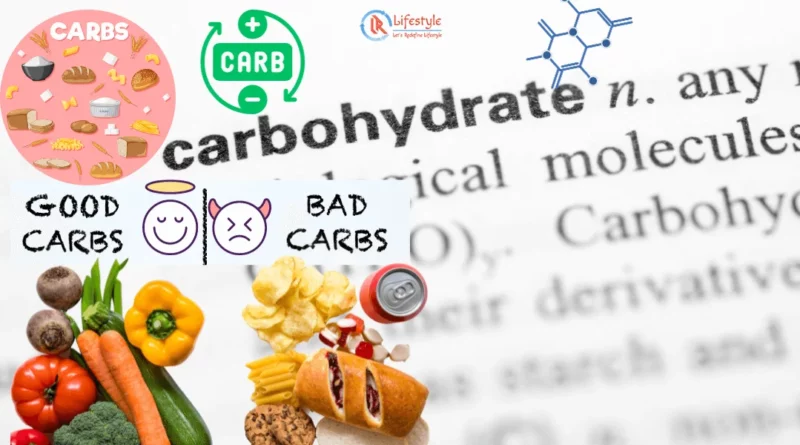The Good, the Bad, and the Ugly of Carbohydrates
Carbohydrates: The Essential Fuel for Your Body
Carbohydrates, commonly known as carbs, are the sugars, starches, and dietary fiber found in plant-based foods and dairy products. When you eat these, your body breaks them down into glucose, a form of sugar that your body uses for energy. It’s like fuel to power your day!
Carbohydrates are one of the three macronutrients that our bodies need to survive, along with protein and fat. They are the main source of energy, and they play a vital role in many other bodily functions, such as brain development and cell repair.
However, not all carbohydrates are created equal. Some carbohydrates are better for our health than others and some are very bad as well. In this article, we will explore the good, the bad, and the ugly of carbohydrates so that you can make informed choices about what to eat or what not.
Types of Carbohydrates
There are three main types of carbohydrates based on their chemical structure and how the body processes them: sugars, starches, and fiber.
Sugars: These are simple carbohydrates, either naturally occurring or added to foods and drinks. Natural sugars are found in fruits, vegetables, and dairy products. Added sugars are present in sweets, sugary drinks, and processed foods. While natural sugars are generally considered healthier as they come with fiber and other nutrients, added sugars should be limited in your diet.
Starches: Starches, also known as complex carbohydrates, consist of long chains of glucose molecules. Common sources of starches include grains like rice, wheat, and oats, as well as legumes (such as Beans, peas, and lentils) and vegetables. Starches are broken down into sugars during digestion and provide a steady release of energy.
Fiber: Fiber is a type of carbohydrate that the body can’t fully digest. It’s mainly found in plant-based foods such as fruits, vegetables, whole grains, nuts, and seeds. Fiber is crucial for maintaining a healthy digestive system, promoting a feeling of fullness, and helping manage blood sugar levels.
The Good
Good carbohydrates are complex carbohydrates that are high in fiber and nutrients. They are found in whole grains, fruits, vegetables, legumes (such as Beans, peas, and lentils), and nuts. Complex carbohydrates are digested slowly, which provides us with sustained energy throughout the day. They also help to regulate blood sugar levels and reduce cholesterol levels.
Some Examples of Good Carbohydrates:
Whole grains: oats, brown rice, quinoa, whole-wheat bread and pasta
Fruits: apples, bananas, berries, citrus fruits, avocados
Vegetables: leafy greens, broccoli, Brussels sprouts, carrots, sweet potatoes
Legumes: beans, lentils, peas
Nuts: almonds, walnuts, cashews, peanuts
The Bad
Bad carbohydrates are refined carbohydrates and added sugars. Refined carbohydrates are carbohydrates that have been stripped of their fiber and nutrients during processing. Added sugars are sugars that are not naturally present in food, but are added during processing or cooking.
Refined carbohydrates and added sugars are digested quickly, which can cause blood sugar levels to spike and then crash. This can lead to feelings of hunger, fatigue, and mood swings. Refined carbohydrates and added sugars are also associated with an increased risk of obesity, type 2 diabetes, heart disease, and other chronic health conditions.
Some Examples of Bad Carbohydrates:
Refined grains: white bread, white rice, white flour pasta
Sugary drinks: soda, juice, sports drinks
Sweets: candy, cookies, cakes, ice cream
Processed foods: chips, crackers, cookies, snacks
The Ugly
The ugly carbohydrates are the ones that are so processed and refined that they have lost all of their nutritional value. These carbohydrates are often found in low-carb and sugar-free foods.
Low-carb and sugar-free foods are often made with artificial sweeteners and other unhealthy ingredients. They can also be high in unhealthy fats. Eating too many low-carb and sugar-free foods can lead to a number of health problems, including nutrient deficiencies, weight gain, and digestive problems.
Some Examples of Ugly carbohydrates:
Low-carb bread and pasta
Sugar-free candy and cookies
Artificial sweeteners: aspartame, sucralose, saccharin
Processed meats: bacon, sausage, hot dogs, pepperoni
How to Choose the Right Carbohydrates for Your Health
When choosing carbohydrates, it is important to focus on complex carbohydrates that are high in fiber and nutrients. These carbohydrates will provide you with sustained energy and help to improve your overall health.
It is also important to limit your intake of refined carbohydrates and added sugars. These carbohydrates can lead to a number of health problems, including obesity, type 2 diabetes, heart disease, and other chronic health conditions.
Some tips for choosing the right carbohydrates for your health:
Choose whole grains over refined grains.
Eat plenty of fruits and vegetables.
Include legumes and nuts in your diet.
Limit your intake of sugary drinks and sweets.
Avoid processed foods as much as possible, eat only if it is necessary.
Read food labels carefully and look for hidden sources of sugar.
Conclusion
Carbohydrates are an important part of a healthy diet. However, it is important to choose the right carbohydrates. Complex carbohydrates that are high in fiber and nutrients are the best choice for your health. Refined carbohydrates and added sugars should be limited.
Frequently Asked Questions (FAQs) about Carbohydrates
What are carbohydrates, and why are they important for the body?
Carbohydrates are organic compounds made up of carbon, hydrogen, and oxygen. They are the body’s primary source of energy, fueling various bodily functions, including brain activity, muscle movement, and cell production.
How many carbohydrates should I eat each day?
The amount of carbohydrates you need each day depends on a number of factors, such as your age, sex, activity level, and overall health. However, as a general rule, adults should get 45-65% of their daily calories from carbohydrates.
What are the good sources of carbohydrates?
Good sources of carbohydrates include whole grains, fruits, vegetables, legumes, and nuts. These carbohydrates are high in fiber and nutrients and provide sustained energy throughout the day.
What are complex carbohydrates?
Complex carbohydrates are long chains of sugar molecules found in foods like whole grains, fruits, vegetables, and legumes. They provide a steady release of energy and are rich in fiber, aiding in digestion and weight management.
What are simple carbohydrates, and how do they affect the body?
Simple carbohydrates are sugars with a simple molecular structure. They are quickly digested, causing a rapid spike in blood sugar levels. Overconsumption can lead to weight gain, energy crashes, and an increased risk of health issues.
What are refined carbohydrates?
Refined carbohydrates are grains that have been processed to remove the bran and germ, reducing their nutritional value. Foods like white bread, white rice, and pasta are examples. Consuming too many refined carbohydrates can contribute to various health problems.
How can I choose healthier carbohydrate options?
Opt for whole, unprocessed foods like whole grains, fruits, vegetables, and legumes. Read labels to identify added sugars and prioritize foods with minimal to no added sugars. Balance your carbohydrate intake with proteins and healthy fats for sustained energy.
Can a low-carb diet be beneficial for weight loss?
Low-carb diets can be effective for weight loss as they often reduce overall calorie intake and help manage blood sugar levels. However, the type and quality of carbohydrates matter. It’s important to focus on complex carbohydrates and monitor portion sizes.
Are there any health conditions that require monitoring carbohydrate intake?
Individuals with diabetes need to monitor their carbohydrate intake carefully to manage blood sugar levels. A registered dietitian can help tailor a suitable eating plan. Additionally, those with certain metabolic disorders may need to limit specific types of carbohydrates.
Are low-carb diets healthy?
Low-carb diets can be helpful for weight loss in the short term. However, they can also lead to nutrient deficiencies, digestive problems, and other health problems in the long term. It is important to talk to your doctor before starting a low-carb diet.
Are bananas complex carbs?
Yes, bananas primarily consist of complex carbohydrates. These carbs include a special type called resistant starch, known for its digestive health benefits. Besides being a great source of complex carbs, bananas are also packed with essential vitamins and potassium, promoting good blood pressure and overall well-being. Including bananas in your diet can be a nutritious choice for your health.
How can I strike a balance between enjoying carbohydrates and maintaining a healthy diet?
Balance is key. Opt for whole, nutrient-rich carbohydrates and be mindful of portion sizes. Pair carbohydrates with proteins and healthy fats to regulate blood sugar levels. Listen to your body’s hunger and fullness cues, and be mindful of your overall dietary choices.
Also Read:
Exploring Simple and Complex Carbohydrates (Carbs): Everything You Need to Know
For News related to entertainment visit our entertainment website:
https://www.glamworldtalks.com/



